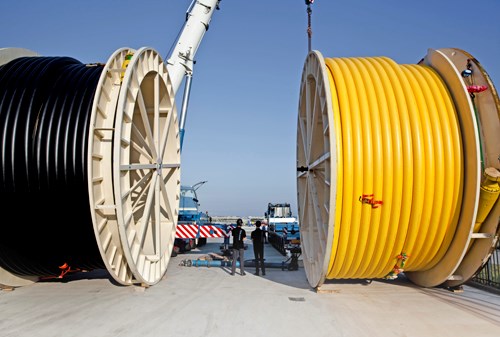Thermoplastic composite riser making waves in oil and gas work
The use of composites in deepwater oil and gas drilling has been long sought, and few companies have been more active than Netherlands-based Airborne Oil & Gas, which manufacture thermoplastic composite pipe that is being tested in Brazilian waters.

Massive spools of Airborne Oil & Gas' thermoplastic composite pipe.
Thermoplastic oil and gas pipe specialist Airborne Oil & Gas (IJmuiden, The Netherlands) says the Libra consortium has invited Airborne to perform a failure mode, effect and criticality assessment (FMECA) for a thermoplastic composite pipe (TCP) Riser that could be used at the giant Libra field offshore Brazil. The request followed a successful feasibility study (preliminary version) performed by Airborne Oil and Gas and Wood Group Kenny, that showed a 45% reduction in top tension in a cost-effective riser solution, using a hybrid riser design comprising of the conventional flexible pipe (used for the top and bottom riser-sections) and the TCP section inserted at the mid-water depth.
Henk de Boer Ph.D., engineering manager Airborne Oil & Gas, says, "We are independent in our material choice and select the right material for every application. In this case, we assessed three different composite materials in the riser design and optimized it for installation, fatigue, top tension and pipe cost. Interestingly, the most cost effective riser solution turned out to be the technically best performing as well."
Airborne says the TCP Riser solution (provided for the full riser length) could offer significant benefits in deep water riser applications: first, the lightweight TCP Riser reduces the top tensions up to 50% (as compared with the conventional flexible pipe), reducing the weight loading on the floating, production, storage and offloading (FPSO) vessel. Second, says Airborne, the TCP Riser itself is a simple monolithic wall pipe; while still flexible, it is inherently simple in its design leading to a cost effective solution for deeper waters.
Airborne Oil & Gas is the world's first manufacturer of Thermoplastic Composite Pipe (TCP) to have qualified its design, production and materials in compliance with the new DNV Recommended Practice for Thermoplastic Composite Pipe, DNVGL RP F119. The FMECA will be conducted in accordance to this recommended practice.
Related Content
-
Revolutionizing space composites: A new era of satellite materials
A new approach for high volumes of small satellite structures uses low-CTE, low-cost CFRP cellular core, robust single-ply skins and modular panel systems to cut lead time, labor and cost for reflectors, solar arrays and more.
-
Composites end markets: Energy (2024)
Composites are used widely in oil/gas, wind and other renewable energy applications. Despite market challenges, growth potential and innovation for composites continue.
-
ZEBRA project demonstrates closed-loop wind recycling system
Consortium partners have proven the complete recycling of thermoplastic wind turbines via two manufactured wind blades, featuring reduced operating cost, CO2 emissions.



